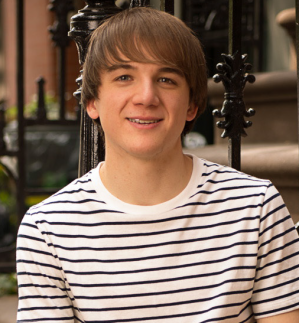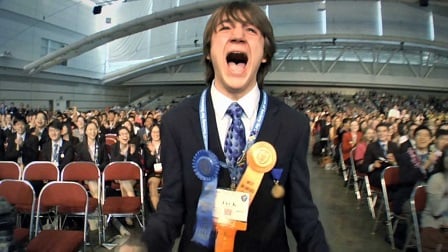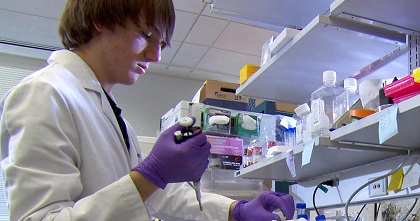 |
| http://www.harpercollinsspeakersbureau.com/speaker () |
"Heroes represent the best of ourselves, respecting that we are human beings. A hero can be anyone from Gandhi to your classroom teacher, anyone who can show courage when faced with a problem. A hero is someone who is willing to help others in his or her best capacity" (Martin). Heroes do not have to have Superman-like qualities. Anyone who positively affects even just a single person is a hero. There is no level to reach. A hero overcomes the status quo, is selfless, and has determination to finish what they started.
Jack Andraka knew he would not have much credibility as an inexperienced teenager, but he also knew his idea to combine carbon nanotubes and antibodies could potentially cure many diseases. His conviction led to a revolutionary scientific invention, but also showed others his strong self-confidence. Jack Andraka grew up in suburban Crownsville, Maryland with his parents and older brother, Luke. As kids, he and his brother constantly performed experiments while other children were outside playing in parks. He entered science fairs and won many awards, including the Intel International Science and Engineering Fair (ISEF) grand prize, widely presumed as the most prestigious award a teen scientist can receive. After Andraka's epiphany about antibodies and carbon nanotubes, he faced many rejections from older and more experienced scientists. Finally, after an extensive interview, Dr. Maitra at Johns Hopkins University School of Medicine allowed Andraka to work in his lab. A hero fights against the everyday norm, is selfless, and has persistence even when obstacles are thrown in their path. Jack Andraka is a hero because he overcomes the status quo, is selfless, and has determination that inspires everyone around him.
 |
| (http://inspiremykids.com/2013/jack-andraka-master- ()) |
Although he was constantly bullied in middle school, Andraka overcame the stereotypes and bettered himself for it. According to an article by the Daily News in London, he was tormented for being so scientifically smart and for being homosexual. From the article, "At school, Jack won prizes for science projects, but was ostracised as a geek and viciously bullied when he came out as gay, aged 13...At summer camp, Jack met a sympathetic counsellor, and began to channel his grief into the science that would make him a star" (Geeky teen emerges...4, 6). Through all the bullying from classmates at school, Andraka managed to overcome it and improved his skills in the scientific field. He used his bullies to motivate him into doing better and overcoming the stereotypes set against him. After entering and winning ISEF, Andraka was suddenly propelled to popularity. According to Abigail Tucker, "Since he won the $75,000 grand prize at this past spring's Intel International Science and Engineering Fair, one of the few freshman ever to do so, he's become a North County High School celebrity to rival any soccer star or homecoming queen" (Tucker 1). As a result of his newfound appreciation, recognition, and attention, he had motivation to prove his childhood bullies wrong, and had another push to do something greater and advanced his early-detection test idea. Although Jack Andraka went through years of torture from his peers, he turned that into an incentive to do better and overcame the insults thrown at him.
 |
| (http://www.cbsnews.com/news/boy-wonder-jack-andrak ()) |
Andraka selflessly sacrificed his time to develop his cancer test. According to Abigail Tucker, he spent months completing a frustratingly long process to invent a working test that detected pancreatic cancer. She wrote, "Instead, the young scientist worked for seven months, every day after school and often on Saturdays until after midnight, subsisting on hard-boiled eggs and Twix as his mother dozed in the car in a nearby parking garage. He labored through Thanksgiving and Christmas. He spent his 15th birthday in the lab" (Tucker 11). Jack Andraka was willing to dedicate so much of his time to this early-detection test. Even though he could have been spending time with his friends or family, he worked tirelessly in the Johns Hopkins lab. His main motivation was that if he invented this test before his uncle died of pancreatic cancer, he may have still been alive. Andraka said, "This test can save lives. This test can end pancreatic cancer as we know it. If this test had been around, maybe Uncle Ted would still be alive" (Andraka 142). Inspired by Uncle Ted's death, he spent months trying to find a way to make his test work. Using this inspiration, he pushed through hours of labor to attempt to save thousands of other lives. Jack Andraka worked selflessly to help others with pancreatic cancer and advanced the statistics of the cancer that already had an extremely low survival rate.
Without his immense determination, Jack Andraka would not have been able to invent a working test. His parents began to doubt his idea would even work, but he did not let that distract him and just kept pushing for his early-detection test. According to Andraka, "I was not about to give up now. Not when I was so close. My test works. I know it does. I just have to prove it to the rest of the world. I just need that one chance" (Andraka 3). Andraka showed great dedication to his invention by not giving up after his parents doubted him, and when 199 scientists refused to give him the lab space he needed. He knew his test would work if he found the right way, and stayed true to that even after more experienced scientists refused to acknowledge him. Although Andraka's lack of knowledge presented a challenge during his research, he learned how to interpret the scientific words and what he needed to do to help his test succeed. From an article, "Initially, he thought of trying to find a cure for pancreatic cancer an ambitious task, given that he didn't know what a pancreas was" (Geeky teen emerges...7). Andraka showed great determination because he was not deterred by the lack of knowledge he had about pancreatic cancer, and instead used it to aid himself. Although he did not know what he was about to head into, he used his uncle's death as a motivation for himself and pushed to develop his test. Without Jack Andraka's strong determination, his early-detection cancer test would not have been invented, and a revolutionary way to cure diseases would not exist. As a result of overcoming the status quo, selflessness, and determination, Jack Andraka inspired other teenagers to push the bounds of society. A hero helps others in any way they can, and Andraka's accomplishments helps others to motivate themselves to aspire to be akin to him. He is inspirational, not just because he invented an amazing test, but because he pushed past his hardships and did something amazing with his life. Andraka proved that even someone as young and inexperienced as he was can still come up with brilliant ideas and inventions. After his uncle died, he used that sadness to motivate himself to help prevent the disease that killed him. Take Jack Andraka's desire to help others, use the teenage boundless thinking preprogrammed in our brains, and improve the world. A hero can be anyone. Today, be the hero that changes the world for the better. Works Cited Andraka, Jack, and Matthew Lysiak. Breakthrough: How One Teen Innovator Is Changing the World. New York, NY: Harper, an Imprint of HarperCollinsPublishers, 2015. Print. "Geeky teen emerges from the lab a superstar." Daily Mail [London, England], 17 Apr. 2015, p. 32. Biography in Context, link.galegroup.com/apps/doc/A410023825/BIC1?u=powa9245&xid=eac339a6. Accessed 5 May 2017. "Ricky Martin Quotes." BrainyQuote. Xplore, n.d. Web. 16 May 2017. Tucker, Abigail. "The prodigy: a Maryland high-school sophomore who reads science journals for fun may have invented a new diagnostic test for a deadly form of cancer." Smithsonian, Dec. 2012, p. 68+. Biography in Context, link.galegroup.com/apps/doc/A319615378/BIC1?u=powa9245&xid=3fa55541. Accessed 5 May 2017.
Page created on 5/27/2017 12:00:00 AM
Last edited 5/27/2017 12:00:00 AM
